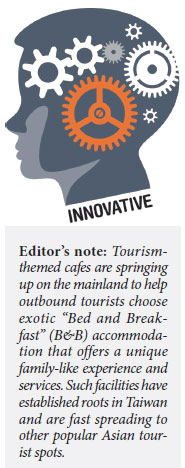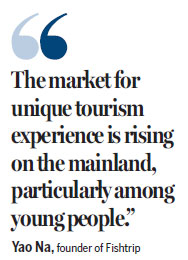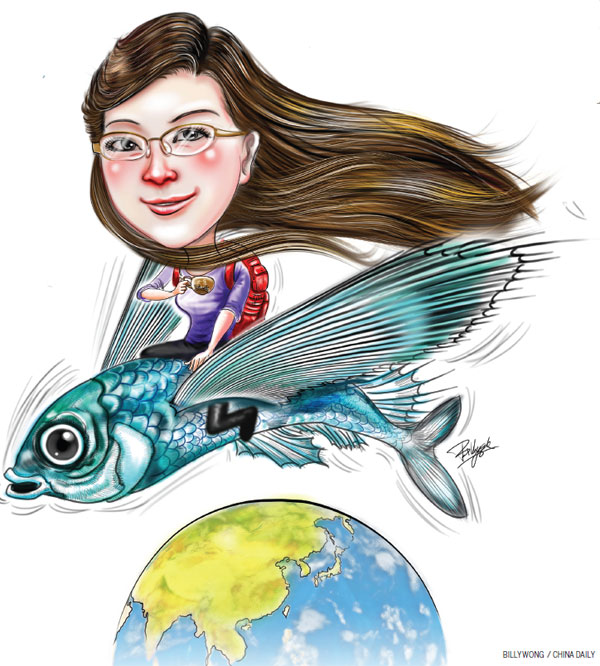There's nothing fishy here!
Updated: 2015-05-14 09:20
By Yang Ziman(HK Edition)
|
|||||||||

Fish Cafe - the first tourism-themed cafe in Beijing - is mobilizing travelers to help them find the most interesting "Bed and Breakfast" (B&B) facilities around the world.
The cafe, owned by Beijing-based travel agency Fishtrip, connects self-help mainland tourists with small- and medium-sized non-franchised exotic accommodation providers worldwide. At the moment, Taiwan has turned out to be the best-developed market with more than 2,500 B&Bs that have signed cooperation agreements with Fishtrip.
"B&Bs are highly developed in Taiwan. Many of them are of small size, privately owned by local residents, and partly the owner's home. That's how they are able to offer in-depth experiences of local customs and natural scenery," says Yao Na, founder of Fishtrip who used to work for Google.
Yao has traveled to many major tourism destinations around the world. Eager to get a closer look at the local life, she usually chose to stay at B&Bs run by locals. "Since these places are generally small and non-branded, it was time consuming to look up for information in the travel entries of other tourists. Also, on arrival, I had nowhere to complain if they forgot to reserve a room for me," recalls Yao.
From there, when she decided to start her own tourism company, Yao came up with the idea of making the information of exotic hotels easy to find for tourists who, like her, want more than superficial visits to famous tourist destinations. She chose Taiwan as the first market to explore because both self-help tourism and exotic hotels are thriving there.
Fish Cafe, which got its name from the Hollywood movie Big Fish about multiple possibilities of a person's life, is Yao's first attempt at bringing other possibilities to travelers apart from staying in standardized hotels. It now has the biggest market share on the mainland among online information platforms on exotic hotels in Taiwan.
Customers are not only able to get their visit passes to Taiwan faster than they normally do, but also get recommendations from exotic hotels that have signed pacts with Fishtrip.
"The market for unique tourism experience is rising on the mainland, particularly among young people. In hotels run by locals, the owners usually befriend their customers and show them places that are little known to tourists," Yao says.
Self-help tourism for mainland travelers in Taiwan started in 2011. Now residents in 47 mainland cities can apply for non-group travel on the island. Yet, no more than 4,000 visitors from the mainland can travel individually in Taiwan per month.
According to statistics from Ctrip - one of the mainland's leading online travel agencies - more than half of the mainland visitors in Taiwan last year were self-help tourists.
Fishtrip has initiated a project called "Hunters' Plan" that brings both the company's staff members and individual travelers together in B&B hunting. The first one took place last July in Taiwan. Since then, the plan has uncovered a lot more little-known B&Bs on the island.
Lulu's Villa, a sea side hotel at Kenting in southern Taiwan, also offers marriage proposal plans as part of its services. After meeting his love of life during a trip to Thailand, the owner turned his villa into a hotel named after his wife. He himself made a romantic proposal to his wife in the villa.
In an aquarium based also in Kenting, tourists are able to spend their night in the tunnel watching sea creatures swimming above them as they fall asleep. This service is particularly popular among children and couples. There are also other types of B&Bs in Taiwan, such as bicycle and monster-themed ones and those run by indigenous people, that have now signed agreements with Fishtrip to be introduced to more mainland tourists.
"Fish Cafe's standards for choosing exotic hotels include that they must have a high quality-price ratio, that the owners must be willing to share their personal experiences in life, and that there must be some special activities or sightseeing spots," says Nie Shichao, a project manager of the company.
Fishtrip has developed an application for mobile phones providing users information about exotic hotels they have discovered while traveling. Once their information has been approved and accepted, they can get 150 to 200 yuan in cash prizes for their recommendations.
"Mainland tourists usually pick Asian destinations as their first stop in outbound travel. Exotic hotels are particularly well-developed in Asian countries and regions," says Pan Ying who helps in Fishtrip's marketing efforts.
"Taiwan and Japan, at the moment, are our primary markets. We are also moving on to Thailand, Vietnam, Myanmar, Malaysia, Singapore, South Korea, and so on We have observed a global trend in in-depth travel. In future, our application will be expanded from exotic hotel recommendation to other aspects concerning travel, such as food and clothing."
In this O2O (online to offline) business model, Fish Cafe is turning the cafe venue into a place for get-togethers of travelers or, more broadly, anyone who loves sharing.
Industrial cafes are catching on on the mainland. For instance, another two cafes in Beijing - 3W Coffee and Garage Cafe - are respective platforms for people in the Internet industry and startup businesses.
Fishtrip, dedicated to opening up all sorts of possibilities in travel, is a hotspot for travel. Things collected by people on the go are put on sale in the cafe, such as silverware used by French royalties and coffee beans from around the world.
"In a large city like Beijing, not many people come to a cafe for the coffee itself. They want to meet interesting people and join get-togethers," explains Yao. "We are not going to charge people any fee when they come here to host a meeting or a salon in the cafe, except for what they pay for the coffee."
yangziman@chinadaily.com.cn


(HK Edition 05/14/2015 page1)